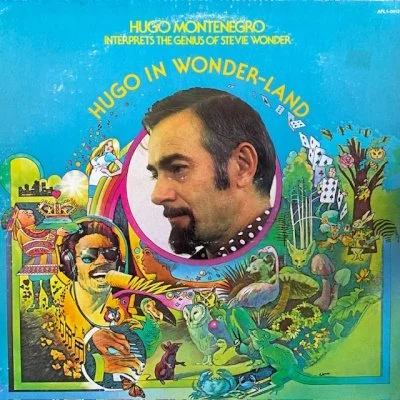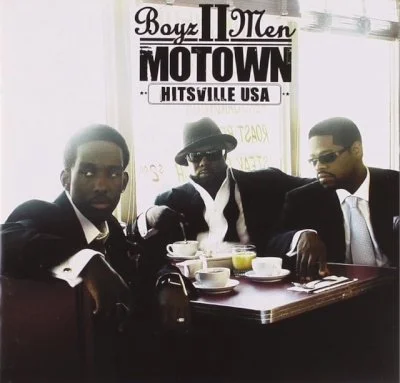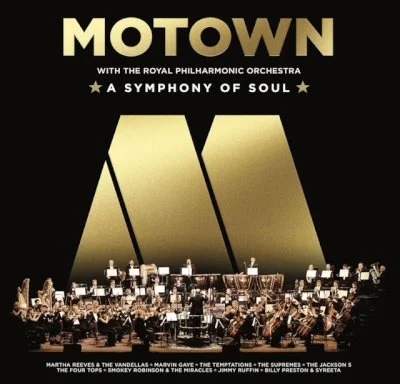Paying Their Respects
FROM THE FANTABULOUS STRINGS TO THE ROYAL PHILHARMONIC
Do you remember all those Motown tribute albums? They’re an eclectic breed, to be sure, and sometimes unlikely (or worse).
How about Hugo Montenegro’s Hugo In Wonder-Land? The Tequila Brass’ Tamla Meets Tijuana? The New Christy Minstrels’ On Tour Through Motortown? The Nashville Guitars In Detroit? Then there’s Bert de Coteaux Plays A Stevie Wonder Songbook and – how could anyone forget? – Those Fantabulous Strings Play The Supremes Hits.
‘Such an identifying stamp’
That selection dates back to the 1960s and ’70s, but there has been no shortage of similar sets in the 21st century. If anything, there have been more, as the Motown legacy – and those of its stars – endures.
Examples which come to mind, good or otherwise? Michael Bolton’s Ain’t No Mountain High Enough: A Tribute To Hitsville U.S.A. (2013), Phil Collins’ Going Back (2010) and Michael McDonald’s Motown and Motown Two (2003/2004), both released by, er, Motown. The first of these outings by the ex-Doobie Brother was a Top 20 album in the United States, while the second went Top 10. Also, former Motown hitmakers Boyz II Men returned home, so to speak, with their 2007 Decca release, Motown: Hitsville USA.
And there were still more, such as Nnenna Freelon’s Tales of Wonder (Stevie, of course) and Kevin Mahogany’s pride & joy, both in 2002; A Twist Of Motown, by various jazz musicians, including George Benson, Bob James and Lee Ritenour in 2003; and the James Taylor Quartet’s Don’t Mess With Mr. T in 2007.
Other tributes served as a reminder of the global reach of “The Sound of Young America,” ranging from Brazil’s Sandra de Sá (Pare, Olhe, Escute in 2002), France’s Gilbert Montagne (Get Ready, 2006), Germany’s Young Voices Brandenburg (Echoes of Motown, 2011) and Ireland’s Boyzone (Dublin To Detroit, 2014). In the U.K., there was 2000’s Motown Mania, mostly produced by Hitsville admirer Pete Waterman with the likes of Lulu, Lisa Stansfield, Westlife and S Club 7.
Down Under, the quartet known as Human Nature recorded three albums of Motown covers: Reach Out: The Motown Record (2005), Dancing In The Street: The Songs of Motown II (2006) and Get Ready (2007). The last of these included appearances by Smokey Robinson, Martha Reeves and Mary Wilson, while Robinson went further by “presenting” Human Nature in their Las Vegas residency in 2013 and recording “Please Come Home For Christmas” with them in 2015. (He also sang “Cruisin’ ” with de Sá on her album.)
‘DIFFICULT’ SONGS TO TREAT
Of the older tributes, perhaps Hugo Montenegro’s instrumental Hugo In Wonder-Land is the most intriguing – not least because Stevie himself endorsed the idea. “Hugo,” he wrote in the RCA album’s liner notes, “my thanks began upon my learning you were going to record my material and shall end when there is nevuary.” Wonder also explained the last word: “no eternity.”
Then again, Montenegro recruited some of California’s finest musicians for the project, including Wilton Felder (bass), Hal Blaine (drums), Tom Scott (woodwinds), Bobbye Hall (percussion) and a figure controversial in some Motown circles, bassist Carol Kaye. “These hits were the most difficult songs to treat,” wrote Montenegro, “because they have such an identifying stamp on them.” On his next album, Others By Brothers, he cut four more Motown copyrights – and among the session musicians for that was bass god James Jamerson. (His son, James Jamerson, Jr., was on 1993’s Playing The Hits From The Motor City by Spirit Traveler, alongside James Gadson, Wah Wah Watson, Eric Gale and more.)
Back to Motown: Boyz II Men
Norman Smith, co-producer of 1971’s Tamla Meets Tijuana had impressive credentials, too. He served as recording engineer for all the Beatles’ sessions from their EMI Records audition to Rubber Soul, and was producer of the first three Pink Floyd albums. Also, he produced the Pretty Things’ S.F. Sorrow for EMI’s Columbia imprint, which was subsequently picked up by Motown as an early release on its Rare Earth rock label.
But let’s continue with a more recent adventure: 2021’s A Symphony Of Soul, billed as “Motown with the Royal Philharmonic Orchestra,” and released by one of Universal Music’s U.K. labels, UMC. The original recordings by, among others, the Four Tops (“Reach Out I’ll Be There”), Marvin Gaye (“I Heard It Through The Grapevine”), the Supremes (“I Hear A Symphony,” appropriately), the Temptations (“My Girl”) and the Jackson 5 (“I’ll Be There”) soared once more with the additional skill of 36 musicians from Britain’s most in-demand classical orchestra.
A Symphony Of Soul was produced by Brian Rawling and Paul Meehan, whose earlier credits happen to include that 2014 Motown tribute album by Irish boy band Boyzone, Dublin To Detroit. “The idea for ‘Symphony’ was mine,” Rawling told me the other day. “I always loved the strings on the early Motown records, and thought it would be a classic idea to make the orchestra and string parts feature on some alternative versions of the great, three-minute records they are.”
The concept was endorsed by an entrepreneurial friend, Ian Brown, who works in the music and media business as a songwriter, A&R consultant and filmmaker. “The actual process was the best bit,” explained Rawling, recalling how he was introduced to Universal Music VP Harry Weinger, who has managed and wisely steered the Motown Records catalogue for many years. “Harry did his best getting me the parts for the songs and original vocals.” This included the multi-tracks, some in three-track and some with more, according to Rawling.
INSPIRING THE PLAYERS
“Paul Meehan and I sat in our studio for days, listening to the original vocals and some outtakes and parts. How Motown made these records on three-track just showed what great talent they had. We worked with orchestra arrangers Matt Brind and Rob Eckland, who were themselves in awe of the Motown arrangers, and worked hard on getting sympathetic parts – we hoped – making the string parts longer and featuring them more.”
After that, Rawling and Meehan recorded the Royal Philharmonic at London’s British Grove Studios. “The players were so inspired hearing the original vocals as they played. The arrangers were sympathetic to the feel of the vocals, and we had some great light and shade moments.” For one, he remembered that Martha & the Vandellas’ “Dancing In The Street” had “the snare drum or handclap on the vocal track, which made it really interesting to mix.”
A Symphony Of Soul also included two recordings with new vocals, “duetting” with the singers on the originals, namely, Mica Paris with Jimmy Ruffin on “What Becomes Of The Brokenhearted” and Beverley Knight with Marvin Gaye on “Abraham, Martin And John.”
From ‘the best recording studio in the world’
“I always thought ‘Abraham, Martin And John’ was such a great song,” said Rawling, “and with its layout, I thought it could make a duet. So I got James Morrison on the second verse and Beverley on the third. The result was amazing, and I thought that this would make a perfect single a couple of weeks before the album dropped, to gain much more interest in a ‘catalogue’ release.” Gaye is Morrison’s hero, according to Rawling, but the young singer’s manager nixed the idea. “With Beverley, it’s good, but nowhere near as good as the other version.”
The idea to have Mica Paris with Jimmy Ruffin on “What Becomes Of The Brokenhearted” came from the record label. “It’s one of my all-time favourite Motown singles,” said Rawling. “Jimmy lived in Queensgate in London for a long time, and I met him a few times. We actually started doing a new version of ‘Hold On To My Love,’ but it just never clicked.”
The entire Motown orchestral project went “pretty much as planned,” by the producer’s recollection, “as we had a lot of pre-production in our studios before we did the RPO. It may have been a little rushed as British Grove was so expensive – as was the Royal Philharmonic – but it’s the best recording studio in the world, in my opinion, owned by Mark Knopfler.”
Rawling confessed that the budget was small, and “there are things I would do a little different [today], but I loved doing the record. I know we only had access to limited tracks, so couldn’t touch some stuff that maybe would have been more interesting and challenging – but, hey, we got to do something with the greatest vocals and songs of all time.”
It seems unlikely that those involved in previous Motown tribute albums had such first-hand experience with, or access to, the tapes of the original recordings. But the continuing inspirational power of the music made inside 2648 West Grand Boulevard once upon a time ensures that A Symphony Of Soul won’t be the last to try.
House notes: Berry Gordy’s business produced its own tribute albums, of course, such as Hits Of The Sixties! by (as they were billed) Choker Campbell and His 16 Piece Band, and That Motown Sound by Earl Van Dyke & the Soul Brothers. And when the Stax catalogue was acquired by the Concord Music Group, the latter put out a compilation in 2008 of those Memphis acts interpreting Motown material, Soulsville Sings Hitsville.
Music notes: the range and variable quality of the many albums described above mandates a playlist, so here it is on Spotify, as are other West Grand Blog playlists. Disappointingly, Those Fantabulous Strings Play The Supremes Hits is not available on streaming services, although it can be found on YouTube here (thanks, John).


